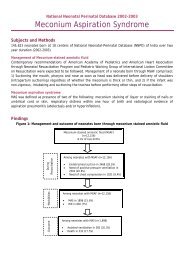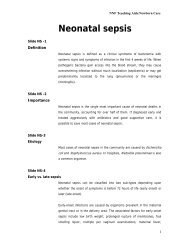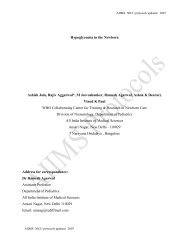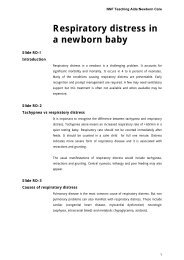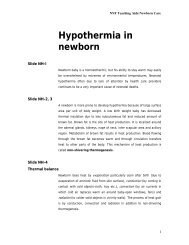Feeding of Low Birth weight Infants - New Born Baby
Feeding of Low Birth weight Infants - New Born Baby
Feeding of Low Birth weight Infants - New Born Baby
You also want an ePaper? Increase the reach of your titles
YUMPU automatically turns print PDFs into web optimized ePapers that Google loves.
AIIMS- NICU protocols 2008<br />
2. Explaining the frequency and timing <strong>of</strong> both breastfeeding and spoon/paladai feeds: Infrequent feeding is<br />
one <strong>of</strong> the commonest causes <strong>of</strong> inadequate <strong>weight</strong> gain. Mothers should be properly counseled regarding<br />
the frequency and the importance <strong>of</strong> night feeds. A time-table where mother can fill the timing and amount <strong>of</strong><br />
feeding is very helpful in ensuring frequent feeding.<br />
3. Giving EBM by spoon/paladai feeds after breastfeeding also helps in preterm infants who tire out easily<br />
while sucking from the breast.<br />
4. Proper demonstration <strong>of</strong> the correct method <strong>of</strong> expression <strong>of</strong> milk and paladai feeding: It is important to<br />
observe how the mother gives paladai feeds; the technique and amount <strong>of</strong> spillage should be noted. This<br />
should be followed by a practical demonstration <strong>of</strong> the proper procedure.<br />
5. Initiating fortification <strong>of</strong> breast milk when indicated<br />
6. Management <strong>of</strong> the underlying condition(s) such as anemia, feed intolerance,etc.<br />
7. If these measures are not successful, increase either the<br />
a. Energy (calorie) content <strong>of</strong> milk by adding MCT oil, corn starch, etc. <strong>Infants</strong> on formula feeds can<br />
be given concentrated feeds (by reconstituting 1 scoop in 25 mL <strong>of</strong> water) OR<br />
b. Feed volume – to 200 mL/kg/day.<br />
Panel 4 Causes <strong>of</strong> inadequate <strong>weight</strong> gain<br />
1. Inadequate intake<br />
Breastfed infants:<br />
Incorrect feeding method (improper positioning/attachment)*<br />
Less frequent breastfeeding, not feeding in the night hours*<br />
Prematurely removing the baby from the breast (before the infant completes feeds)<br />
<strong>Infants</strong> on spoon /paladai feeds:<br />
Incorrect method <strong>of</strong> feeding* (e.g. excess spilling)<br />
Incorrect measurement/calculation<br />
Infrequent feeding<br />
Not fortifying the milk in VLBW infants<br />
Energy expenditure in infants who have difficulty in accepting spoon feeds<br />
2. Increased demands<br />
Illnesses such as hypothermia/cold stress*, bronchopulmonary dysplasia<br />
Medications such as corticosteroids<br />
3. Underlying disease/pathological conditions<br />
Anemia*, hyponatremia, late metabolic acidosis<br />
Late onset sepsis<br />
Feed intolerance and/or GER<br />
* Common conditions<br />
(EBM, expressed breast milk; GER, gastroesophageal reflux)<br />
Downloaded from www.newbornwhocc.org 16



